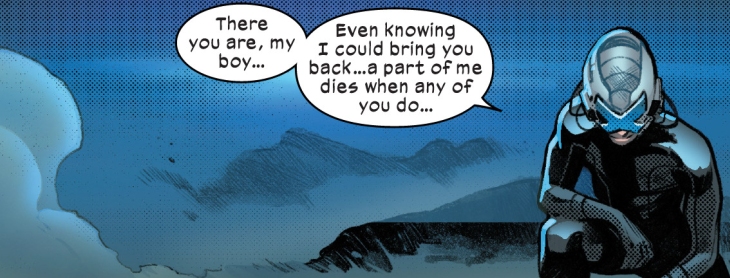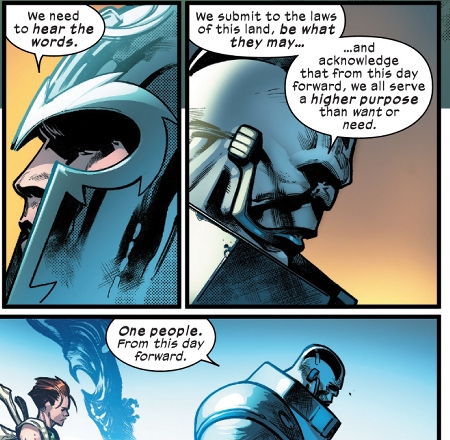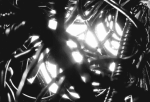First a couple of notes about the previous issue. I was too annoyed by Sinister to read carefully, but there were a few things. The two pages of text about the “rumors” could be more or less easily decoded with some effort, and they seem to contain some foreshadowing, including links to the demonic war with Apocalypse that is shown in the flashback scene a few pages after. That I think will play a role since now we have a quite significant gap between the current timeline and the one with Nimrod 100 years in the future, when we’re been told only ten thousand mutants survived, of which only eight were left in the solar system. So it doesn’t look like Xavier’s plan worked splendidly.
The other aspect easy to miss by reading quickly is that Cypher was being shown touching some leaves and flowers, at Krakoa and behind Xavier’s back, and those turning into “machine”, like a sort of virus in the way that appears to be familiar since it comes from Phalanx/Warlock. I only have one problem with this scene: “behind Xavier’s back” seems disingenuous and pointless. Firstly because this is the “omniscient” Xavier that knows multiple realities, as it is after he “touched” Moira. And then it’s Xavier himself that announces he will leave Cypher on the island for a year, to study the language. So what is that Cypher is doing, right there, that he couldn’t have done any other time? He has no need of secrecy when he’s going to spend a year alone on the island. Whatever Cypher can do should be well within Xavier’s knowledge. So, if Hickman is coherent, this is more something to show the reader, exclusively, and maybe hint that what we see might not even be Cypher’s own intention, and just the arm triggering something. Or it might not even mean anything and it’s just a way for Cypher to connect with the island and further this theme of biologic/machinic hybrid. Or maybe this is the seed that will lead to the eventual collapse of Krakoa, or a contributing factor.
House of X #5 was one again marked in red. The only previous issue marked red was House of X #2, with Moira’s big reveal, so it was expected this issue would be significant… and it was not. Or at least not much.
I was expecting a whole lot of Sinister in this one, instead we only see a couple of loose ends being tied, but no big revelation. This apparently is not the same reaction you might see on the internet, so what’s the deal? The deal is that Xavier invented resurrection, but all the pivotal scenes were already been shown. If Moira’s lives were without a doubt an unpredictable twist, Xavier cultivating mutants as plants in his basement was not only easy to guess, but actually already SHOWN. Not only that, but we also got infos about the consequences, and we already know that Xavier went a step further to also start hybridizing and creating new mutants/mutant powers (if that wasn’t Sinister exclusively, some of those notes are ambiguous, including Xavier’s jedi trick on Sinister). We didn’t quite know it was full blown resurrection, but it’s still a natural extension of what we saw to this point.
The effect is lost on me also because, as I wrote already about the previous issues, even Moira’s power is a sort of resurrection that diminishes all those scenes of tragedy. The badness of tragedy implies permanence, and with multiple realities the feeling of that permanence becomes extremely diluted. Now we just dig a deeper hole, and Xavier’s tears, last issue, look even more silly. It was even WORSE than what I wrote, nothing at all was lost, the permanence of death didn’t even stick for a whole timeline, everyone in the squad is back and refreshed within 48 hours. A flu lasts longer than that.
But Hickman has thought about everything. So here’s the motivation behind Xavier’s fake tears:

He gives answer to fake tears… with rhetoric. I guess it makes sense.
And then it gets worse, because Xavier starts talking of SACRIFICES, and gifts, and giving. Sacrificing what exactly? They went on a suicide mission, achieved their objectives, killed a bunch of other hapless bystanders in the process, bystanders that obviously don’t get the benefit of resurrection a few hours later… but no, it’s Cyclops and his squad who made the “sacrifice”. The rest is pushed off screen, conveniently unseen.
What a bunch of fucking nationalists, egoists and hypocrites. That’s why this mutant resurrection isn’t simply a “process”, but a rite. It acquires symbolic, sacred heft. Transcendent. The “weeping with joy” is the proof of unwavering belief, of the loss of doubt: the sign of madness.
I appreciate the whole thing is CREEPY. But looking at the internet, and seeing actual readers cheering along with Storm, makes me doubt this is the intended effect. This new mutant culture (society, Magneto says) incarnates perfectly everything’s bad, and already deserves extinction MORE THAN EVER. But since when evolution favors morality or honesty? It might as well make sense. Let egoism, dishonesty and brutality prosper, as they always do.
(and the extent of cerebro’s powers would make the removal of the memories of traumatic death pretty trivial)
It’s the concept of “convenience” that annoys me. We now know that Sinister’s genetic database was part of a plan of two halves. Two halves justified by the classic, obsolete dualistic philosophy that wants mind and body separate. The matter and the soul. I wish we could move past these archaic discourses but I guess they can still be tolerable in a comic book. So we have the tangible matter of the body, through Sinister, the “husk”, and then we have Xavier’s cerebro machine, conveniently modified so that now it magically copies people’s souls. Hence proper resurrection is possible: a body is restored and a soul re-injected (some legitimate questions I’ve seen asked, for example about what happens to Wolverine’s adamantium).
I don’t know if this cerebro machine will be expanded later on, since this concept is what “fuels the future” as we’ve seen what follows is all about creating copies and creating machinic minds. But this cerebro in full power seems to already precede Cypher touching Krakoa, so it wasn’t something acquired.
The convenience permeates everything, only mildly justified. It’s for example convenient that Krakoa produces a powerful medicine, to then use as an offer that cannot be turned down by other nations, and make them directly dependent on Krakoa so that they will agree to recognize it as an independent nation.
And then there’s the big convenience of having a mutant that produces golden spheres, that are conveniently then transformed to eggs, that can then be conveniently infused with mutant DNA, then can then be accelerated in growth, and that can systematically be turned into an always successful process through the power of Hope (literally and metaphorically). All these “pieces” being very clearly arbitrary. It’s just one giant deus ex machina that works because Hickman decided that way.
I’m getting to it, Hickman essentially says the the moment Marvel hands over the whole mutantdom to him, then he can simply pick and choose at will what he needs. He has a basket of golden eggs, and can turn them into whatever he wants, just because that wide range of mutant powers is essentially boundless. It’s a deus ex machina served on a silver plate. In its external form because it’s Marvel giving Hickman the breadth of the mutant world, and in its internal form because Xavier unifies and builds that Mutant world so that he can pick and choose within it, just like Hickman. The god is in the machine.
I can appreciate a particular aspect of all this. Hickman doesn’t quite motivate the execution, since it’s all about hand waving, but he cares enough to give it some general “sense”. He does, fairly well, what other writers have done in the past, for example with Civil War (or Vertigo in the 90s). And that is making super-heroes a bit more “mature”, a bit less naive. It was all about injecting some more reality and awareness in that make-believe. Civil War was effective because it was sobering.
Hickman does something quite similar, because he recognizes that mutants are extremely powerful. This story, including all its silliness, is still perfectly coherent with the new picture that Civil War established. The concept is that if mutants are persecuted and hunted, disorganized and on the run, then their powers are “local”. They are arbitrary powers, more or less effective, but still without a direction.
But if you instead unify this “nation” then you obtain something else, because the diversity and range of these powers become a resource. Powers that can somewhat “synergize”, in the way we’ve seen in that resurrection process. So that a power that in its locality would appear as pointless, might instead become an important component within a larger process. And it’s also quite elegant because it goes along with this idea of not just a nation, but a living organism.

(No matter what they make them swear, one nation doesn’t exclude the possibilities of internal disagreements and factions. And it looks like that’s what’s going to happen with Sinister, unless that plot is left out of this introductory series. But still… Xavier’s “no more”, is about the mutant nation being divided. The paradigm shift is precisely about bringing in ALL resources. Including all sort of villains, up to Magneto, Sinister and Apocalypse. No one is left behind or out, quite literally.)
This unity becomes a worthwhile concept that earns them evolution. That will directly lead to that far future scene, at the presence of the Phalanx.
I can appreciate the significance of this concept, and how it’s coherent with the rest. While also thinking the execution is not that great, and it’s still a bunch of convenient deus ex machina rather than using established pieces. All the important pieces simply pop-up as necessary. Many of these are justified because Xavier is near-omniscient through Moira, but there are still giant blocks that have just appeared to make it work. Cerebro soul-backup powers, Krakoa and all its gifts.
Next week is back to Powers of X, so we’ll hopefully have a tiny extension of that Phalanx plot. I want to know what the endgame is.
—
…I was forgetting to add: Hickman digs a bit deeper through text. He explains that Xavier’s plan isn’t quite about resurrecting those mutants that go on a mission and might die. He’s actually trying to resurrect also the other SIXTEEN MILLIONS that died in the past. Even giving us a timetable of 300 years.
I mentioned how I’m annoyed by the “convenience”, and here’s another example. These five mutants that are necessary to the resurrection-machine might obviously have to work full time, given that SCALE of their endeavor, right? (one might wonder, what about automatizing it, huh? Convenience for convenience you have a near omnipotent machinic resource) That makes for some real heavy work. Those five having to completely sacrifice their personal lives as they are instrument (slaves) to an higher, morally elevated and unavoidable purpose… But Hickman thinks of everything. Conveniently. So he explains how the process of resurrection feels like an orgasm, and those five need only go through persistent bliss, that then makes them even more connected and inseparable. So it’s not heavy work, it’s pleasure.
Usually these kinds of rewards get encoded through thousands and thousands of years of evolution. I guess Xavier tampered with the mechanism.

